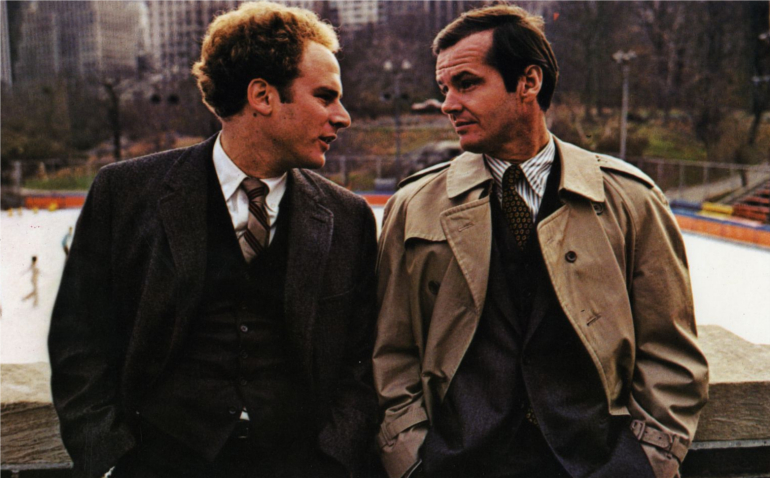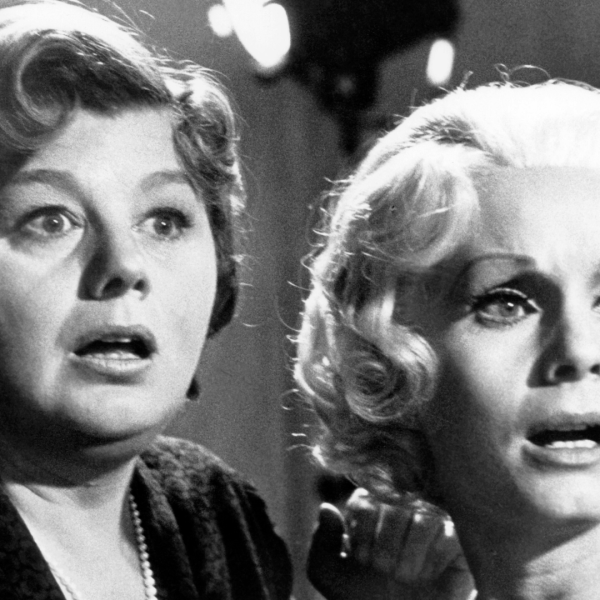As you may already be aware, this past weekend the Film Society of Lincoln Center celebrated the opening of their new film center with a marathon of events that included a conversation between the Coen Brothers and Noah Baumbach and a screening of the ’80s cult film “Valley Girl” with its director Martha Coolidge being interviewed by Kevin Smith. But for their final night of the celebration they left a real treat: a screening of the 1971 classic “Carnal Knowledge” with director Mike Nichols there in person for a Q&A moderated by filmmaker Jason Reitman. The film stars a young Jack Nicholson and Art Garfunkel as two friends beginning to explore the opposite sex, with Candice Bergen and Ann Margret playing the women they become entangled with.

At the time of its release, critic Pauline Kael described it as a “neon sign calling out the soullessness of neon,” but the film has aged incredibly well. For being 40 years old it’s remarkably as sharp today as it must have been when it was released. This writer found it sad that it’s by far the best thing he’s seen in theaters all year, unfortunately it’s about four decades too late to qualify for any Best of 2011 lists. If you haven’t seen it, run, do not walk to your Netflix Instant Queue because it will level you. The Q&A was relatively brief and saw the young Reitman, in awe of his idol, rightfully gushing over the film and even getting tripped up by confusing Polanski’s recent “Ghost Writer” with the Nicolas Cage vehicle “Ghost Rider” for a moment and shamefully admitting he had not seen “Angels In America” (which Nichols had directed for HBO). But for the most part it was a lively and entertaining Q&A that revealed the two filmmakers from different generations still had quite a bit in common.

Nichols believes that the theater-going experience is on its “last legs right now” but “like radio, it takes a long time to die.”
“The thing I love, why I still do this is [to see] a large group of people sitting silent in the dark all seeing something that is not spoken. I love being on either side of that. I love being part of bringing that about, I love feeling it. I love all of us being in a place, seeing something that is unnamed but clear.” He cited the example of the contemptible way Nicholson treats Ann Margret in the film and Reitman asked if it was even possible to upset the audience today as he did in this film. Nichols said, “I think everything has changed quite a lot and usually the thing that gets us is the simpler thing. [A film] doesn’t need many planets or visual effects [to move you]. To be upset [by a film] that has gotten to you [but you] don’t have the words for, that’s one of the reasons we’re here.” Though he admitted to seeing new life spring forth on the stage he admitted that film could still bounce back too. “The thing about the world until it’s over is that you can still get completely surprised. When something goes further and further and further into the toilet and suddenly there’s this beautiful aurora borealis and then there’s a whole new chapter. It might even happen in the movies.”
Nichols, one of a very short list of filmmakers to have an EGOT, has worked with his share of actors on both stage and screen. He also has a theory about why British actors are on the whole, better and more respectable than American actors.
“The reason that most British actors are better than most American actors in the end is that they don’t make any money. At the very end of their lives they get into a space movie and they make a lot of money but until that happens, basically, they don’t have bank accounts. They live from day to day. As the theater moves in that direction, except for the Disney musicals, it’s better because they’re actually doing it to do it. And it’s not a great way to make money. And that’s great [for the art].”

Though controversial for its depictions of frank sexuality, the film is shocking because of how emotionally raw it is. But rather than make a statement about love or relationships, Nichols believes “Carnal Knowledge” is about time above all else.
“Time is in fact what this film is about, I don’t think it’s sex and I certainly don’t think it’s love. I think it’s time and the way that time has of finding out who you are.” When Reitman first watched the film, which opens with the characters as sexually inexperienced college students, he thought to himself, “oh, this is going to be a very charming film. This is so sweet the way they talk about sex” before it just “grabbed him by the balls” as it moved forward in time and it terrified him.
The two directors had different views on the films relevancy today.
While Nichols sees the characters as a product of their time, Reitman believes that they’re universal and reflect the two sides of every man. Nichols believes what’s wrong with the men in the film is specific to a few generations after the second war and “that particular lack of any esteem or even seeing women as anything but receptacles came at an odd time and then left.” Reitman interjected that he believes “we’ve just gotten more conservative and better at hiding it.” The young director sees Nicholson and Garfunkel’s characters carrying two sides of traits familiar to every male, saying that “every man is these two guys and it’s just a question of which one they present to the world. And you’re almost waiting for a ‘Fight Club‘ type moment when you realize it’s in fact the same human being. Every man is both men and it’s just a question of whether we’re honest or whether we lie. Jack Nicholson is the honesty and Art Garfunkel is the well trained.” Nichols liked Reitman’s reading of the film though he had never spoken to the screenwriter Jules Feiffer about this theory specifically.

Art Garfunkel, despite only having acted briefly in Nichols’ previous film, “Catch-22,” holds his own against Jack Nicholson thanks to some acting help from Nicholson himself.
Nichols had cast Nicholson after seeing a pre-release screening of “Easy Rider” and knew he instantly had the qualities to play the character. Garfunkel — best known for being half of Simon & Garfunkel — was more of an unknown quantity and Reitman asked Nichols how he knew that Garfunkel could handle that role. Nichols said, “There was this thing about Art, he was all sweet and beautiful but there was something else. Something a little unnerving, a little malicious, a little other [about him].” To help Garfunkel with his performance Nicholson suggested that he and Garfunkel sleep in the dormitory set that their characters live in together for the first third of the film. Reitman asked if this was a practical location but Nichols said that it was indeed a set. “They spent the night on a stage, going outside using the men’s room, going back to their bunks. And Jack the whole time was teaching Artie his approach to moviemaking which is basically that even on a small, cheap movie there’s like 100, 125 people? Jack is connected to all of them. And he connects with them when you say action and they’re all watching.”
Jack Nicholson had no problem getting nude for the movie (though the scenes were eventually axed).
Nichols said that originally Nicholson had some nude scenes and though they were cut from the film, he was not shy at all about stripping down in front of the crew. Nichols recalled, “I don’t think they’re in anymore I’m happy to say, but he was hilarious! He’d say ‘alright, here comes Steve. Get ready for him!’ He would make such a fool of himself that everybody else was cool.” He also mentioned, “Jack had a hot tub and I don’t have to say any more” trailing off, leaving tales of debauchery to your imagination. But in addition to on set shenanigans, the dynamic between Nicholson and Garfunkel’s characters in the film played out in real life as well. “Artie was over there all the time, at the time he had a girlfriend we were all terrified of, but he didn’t have her all that long. Jack somehow took care of that too. It was so easy, the scenes were so easy we were finished by 3 and 4 o’clock in the afternoon. And we’d go to another Japanese restaurant and Jack would have some stewardess and we were happy.”

Mike Nichols says “kindness is the new porn.”
Reitman may have been effusive with his praise of Nichols and “Carnal Knowledge” but Nichols was equally complimentary to Reitman, telling him he’d already made great films and citing “Juno” in particular as being a standout film. Nichols called the portrayal of J.K.Simmons as a kind father a “miracle” in the film and said “kindness is the new porn. When you see kindness in something it’s so shocking and so emotional…You created a whole family that told each other the truth and actually loved each other and helped each other. It was a wild idea.” Reitman said he could not take credit for this as it was Diablo Cody’s screenplay that formed these relationships but that it was this that had made him fall in love with the screenplay in the first place. Nichols continued, “The whole idea that kindness doesn’t have to be boring, because it is more and more rare. New York, in fact which used to be incredibly pricky is really quite kind now. Everybody’s nice to everybody, by and large. You should have seen it before, it was worse than Paris!”
We’re not the only ones seeing a renaissance on the small screen.
Though Nichols may think the theatrical experience is on its way out, he, like many other filmmakers, believes great things are happening now on the small screen. He said there were about four or five shows he loved and cited AMC’s “Breaking Bad” as being reminiscent of Tolstoy, making the comparison to the Russian author of epics like “War And Peace.” “A great thing is happening in cable TV which is that you see characters changing like in Tolstoy. That’s a whole thrilling new form that I really enjoy, about four to five shows, that really are Tolstoyan in their endless development and surprises and changes. “Breaking Bad” for instance. Unlike the shows that go out and out and out until someone is selling drugs on Mars, this show comes in and comes in and comes in and it becomes like you’re life. Because they’re changing like we change. There are terrific things happening.” Reitman also called the show “phenomenal.” We agree.



